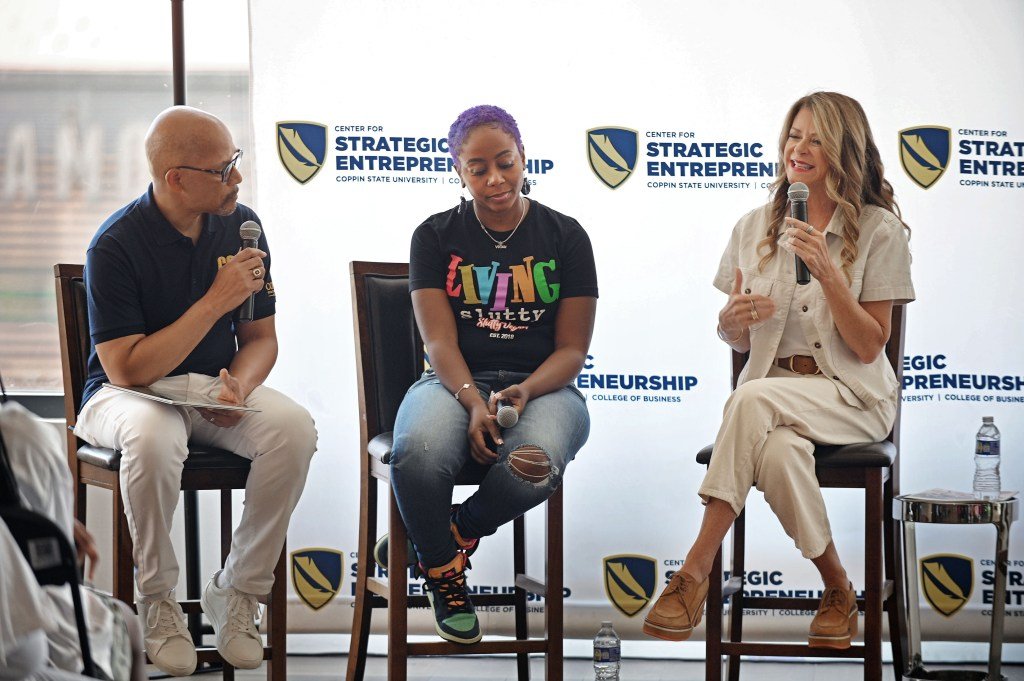In a South Baltimore conference room full of young entrepreneurs, someone asked Aisha “Pinky” Cole how she bounced back from setbacks on her way to founding her popular vegan burger chain, including her first restaurant burning down in a grease fire. Did she “fail again?”
“I fell this morning,” Cole, an East Baltimore native and owner of the Atlanta-based Slutty Vegan and Bar Vegan, said at an event Wednesday aimed at fostering entrepreneurship among the city’s teens and young adults. “I fall every day. … The art of entrepreneurship isn’t if you have a problem, it’s how you get through it.”
Cole offered advice and encouragement to startup founders and youth program students and leaders along with Mary Ann Gilmartin, founder and CEO of New York-based MAG Partners, the master developer of the Baltimore Peninsula mixed-use waterfront community in South Baltimore.
The event, held on the Baltimore Peninsula on Wednesday, kicked off a series of community discussions planned by Coppin State University to explore findings from a newly released report from the Center for Strategic Entrepreneurship.
Coppin’s “Excellence in Entrepreneurship Education” report follows up on a 2017 study by the Annie E. Casey Foundation, which found that Baltimore youth ages 16 to 29 “crave the entrepreneurial spirit and resources to build businesses that are non-discriminatory and benefit their communities.”
Coppin’s study aims to determine how students are preparing to become entrepreneurs, said Ronald C. Williams, an associate professor of management at the university and founding director of the Entrepreneurship Center. Over the course of two years, a team of professors and students have been examining Baltimore training programs aimed at youth and young adults ages 16 to 29, focusing on areas such as structure, methodology, partnerships and effectiveness.
“We focus on learning and learning how to learn, rather than preparing you to be a successful entrepreneur directly,” Williams said in an interview. “We believe that if you learn how to learn, you’ll be better prepared to seize opportunities.”
The report found that the programs had no standard structure, some ran year-round, others only after school or during the summer, and the programs used multiple training methods.
They found gaps in the comprehensive services provided by various partners in areas such as child care and transportation, and that in some cases the effectiveness of programs was tied to funder requirements rather than other metrics. In some cases, programs failed to track the success of participants.
“This is an exploratory study because nothing like this has been done before,” Williams said. “Right now there’s a lot of money going into youth entrepreneurship, but we’re trying to understand what’s actually being offered and what the return on investment is.”
During a panel on Wednesday, Cole and Gilmartin spoke about overcoming obstacles growing up and taking unconventional paths to starting their businesses, saying they built successful businesses by using mentors, developing and investing in their people, and believing in their mission.
Cole grew up on Sedonia Street while his father served time in prison and his mother worked three jobs.
“I had to become a hustler from a young age,” she said.
After graduating from college, Cole moved to Los Angeles to become a television producer and eventually opened his first restaurant, which he ran for two years before losing everything in a fire. He returned to television and worked as a casting director before rediscovering the restaurant business.
Six years ago, she started the “Slutty Vegan” concept in a shared kitchen. The concept has expanded to 14 locations, including one due to open on the Baltimore Peninsula later this year. Cole is a development partner in Rye Street Market with Gilmartin’s company.
“Starting a business is hard work, but it’s worth it,” Cole says, “especially if you have the passion to do something you love.”
Gilmartin, who grew up in New York, got a scholarship after college to work in economic development. Her first job was to convince a possibly armed squatter living in a mobile home to leave a part of a city redevelopment site. She ignored warnings not to speak to him directly, approached him outside a chain-link fence, and eventually worked out a relocation deal that improved his living conditions.
“People thought I’d performed a miracle,” she says. “What did I do? I had conversations. I made connections. I said to myself, ‘If this is what real estate development is all about, I could do this pretty well.'”
Gilmartin told the audience Wednesday that this was the beginning of his interest in real estate, although it wasn’t something he had originally planned.
“Make a plan,” she said, “but be prepared for those plans to fall apart, because that’s just how life works. … Chance favors the prepared mind, but you also need to be open to the possibility that you haven’t yet thought through something that draws you in.”

